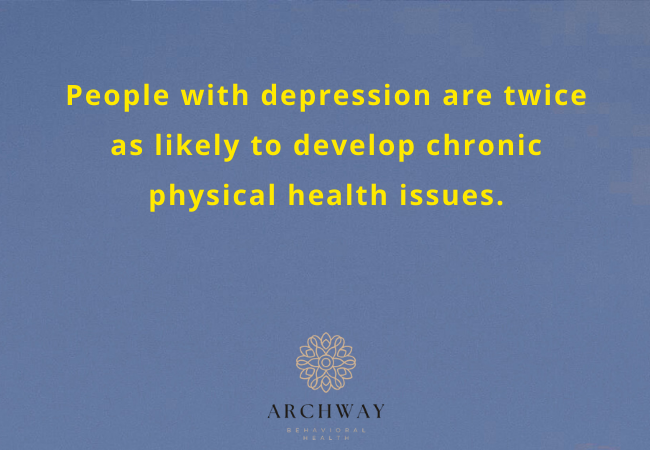In a world that constantly encourages strength, productivity, and perfection, talking openly about mental health is still often met with shame, silence, or misunderstanding. Despite growing awareness, stigma remains a barrier to treatment, healing, and hope for millions of people struggling with anxiety, depression, bipolar disorder, trauma, and more.
At Archway Behavioral Health, we believe that mental health matters—not just for those in crisis, but for everyone. We are committed to breaking the stigma by creating safe, supportive spaces where people can find real help through evidence-based programs like Individual Therapy in Florida, Group Therapy in Florida, and our structured Partial Hospitalization Program (PHP) and Intensive Outpatient Program (IOP).
This blog explores the roots of mental health stigma, the damage it causes, and how awareness, education, and access to care can transform lives.
What Is Mental Health Stigma?
Mental health stigma refers to negative beliefs, stereotypes, and attitudes that lead to discrimination against people living with mental illness or emotional distress.
Types of Stigma:
- Public stigma – Societal judgments and stereotypes (e.g., “People with mental illness are dangerous or lazy”)
- Self-stigma – Internalized shame or belief that needing help makes you weak
- Institutional stigma – Systemic barriers to care (e.g., lack of insurance coverage, underfunded services, workplace discrimination)
These forms of stigma prevent people from seeking help, staying in treatment, or even admitting they’re struggling.
The Impact of Stigma on Mental Health
- 1 in 5 adults in the U.S. experiences a mental health condition every year. (NAMI, 2023)
- Yet over 50% don’t receive treatment, often due to stigma or fear of judgment.
- People with untreated mental illness are at higher risk for:
- Substance use
- Job loss
- Homelessness
- Self-harm and suicide
Stigma doesn’t just hurt feelings—it costs lives.
That’s why education and awareness are critical parts of Mental Health Treatments in Florida and why our team at Archway is passionate about creating a new narrative: one that normalizes seeking help, validates emotional pain, and honors the courage it takes to heal.
Breaking the Myths: What Mental Health Really Is
Let’s start by addressing some of the most common myths:
❌ Myth: Mental health issues are rare.
✅ Truth: They are incredibly common. Anxiety and depression alone affect over 40 million Americans annually.
❌ Myth: Mental illness is a weakness or personal failing.
✅ Truth: Mental illness is a medical condition, just like diabetes or asthma. It results from a combination of genetics, brain chemistry, trauma, and environmental stress.
❌ Myth: Therapy is only for “serious” problems.
✅ Truth: Therapy is for anyone who wants to improve their quality of life, build coping skills, or process emotions. It’s proactive, not just reactive.
❌ Myth: People with mental illness can’t function or succeed.
✅ Truth: With the right support, people with mental health conditions can live full, successful, and meaningful lives. Many of the world’s most creative, intelligent, and accomplished individuals live with mental health diagnoses.
How Awareness Leads to Healing
Raising awareness is more than just sharing facts—it’s about changing hearts and minds.
Awareness:
- Increases early identification of symptoms
- Encourages people to seek professional help
- Reduces discrimination in the workplace, schools, and families
- Helps caregivers and loved ones support those who are struggling
- Empowers individuals to speak up about their experience without shame
At Archway, we use education as a core therapeutic tool in all of our programs—from individual counseling to structured DBT and CBT groups.
Why Mental Health Treatment Matters
Ignoring mental health doesn’t make it disappear. Early, evidence-based treatment can:
- Prevent worsening of symptoms
- Improve physical health
- Restore relationships
- Boost self-esteem and confidence
- Support long-term recovery
Whether someone is struggling with generalized anxiety, bipolar mood swings, or post-traumatic stress, there is hope—and help.
Our Approach to Accessible, Judgment-Free Mental Health Care
At Archway Behavioral Health, we provide comprehensive, compassionate treatment for a wide range of mental health needs. Our programs are rooted in clinical excellence, trauma-informed care, and stigma-free support.
Partial Hospitalization Program in Florida (PHP)
- 5–6 days per week, 6+ hours per day
- Ideal for individuals experiencing moderate to severe symptoms who don’t require 24-hour supervision
- Daily therapy, medication management, and group skills training
- Focus on emotional stabilization, coping skills, and relapse prevention
Intensive Outpatient Program in Florida (IOP)
- 3–5 days per week, 3–4 hours per day
- Best for clients stepping down from PHP or needing structured support while maintaining work or school
- Combines DBT, CBT, and psychoeducation
- Helps clients apply skills in real-life situations while maintaining treatment support
Individual Therapy in Florida
- One-on-one sessions tailored to your unique needs and goals
- Explore past trauma, distorted thinking, identity struggles, or emotional reactivity
- Gain personalized support and tools for resilience
Group Therapy in Florida
- Share, learn, and grow with others on similar journeys
- Build communication skills, reduce isolation, and challenge shame
- Practice new behaviors in a safe, supportive environment
Our Evidence-Based Treatment Methods
We don’t just talk about healing—we deliver it through proven methods:
- Cognitive Behavioral Therapy in Florida (CBT): Reframe negative thinking, reduce anxiety and depression, and build problem-solving skills.
- Dialectical Behavior Therapy in Florida (DBT): Regulate emotions, tolerate distress, and improve relationships.
- Trauma-informed therapy: Address the root causes of emotional pain with compassion and care.
- Medication management: Integrated psychiatric care for symptom stabilization and long-term recovery.
Why Archway Behavioral Health Is Leading the Way
We believe that mental health treatment should be accessible, inclusive, and stigma-free. That’s why we’ve built a care model that combines clinical integrity with compassionate connection.
Why People Choose Archway:
- Highly trained therapists in CBT, DBT, and trauma-focused care
- Integrated psychiatry and medication management
- Multiple levels of care, including PHP, IOP, and outpatient therapy
- Focus on emotional safety, community, and empowerment
- A mission-driven commitment to changing the mental health conversation
Conclusion
Mental health isn’t a weakness—it’s a part of being human. And just like physical health, it deserves attention, care, and compassion. By breaking the stigma, we create space for healing, growth, and honest connection. We open the door for someone—maybe even ourselves—to speak up, seek help, and step into a life that’s no longer shaped by fear or silence.
At Archway Behavioral Health, we believe that every conversation matters. Every story shared chips away at stigma. And every person who reaches out proves that courage is stronger than shame. If you’re ready to take that first step—or help someone else take theirs—call us today at 888.488.4103. Let’s rewrite the mental health narrative together, one voice and one life at a time.
Frequently Asked Questions (FAQ)
What does it mean to “break the stigma” around mental health?
Breaking the stigma means challenging negative beliefs, stereotypes, and misinformation about mental health. It involves promoting open conversations, increasing awareness, and encouraging people to seek support without shame or fear.
Why is mental health awareness important?
Mental health awareness helps people recognize symptoms early, seek treatment sooner, and support loved ones without judgment. It also reduces isolation and creates a more compassionate, informed society.
Is therapy only for people with serious mental illness?
No. Therapy is for anyone who wants to improve their mental well-being, cope with stress, process emotions, or navigate life changes. You don’t need a diagnosis to benefit from therapy.



